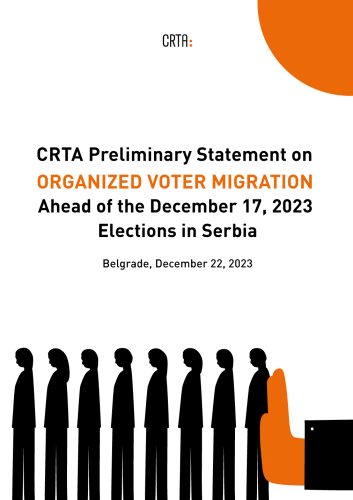Preliminary Statement on Organized Voter Migration Ahead of the December 17, 2023 Elections in Serbia
Organized voter migration is a type of electoral engineering that includes coordinated behavior of voters that temporarily change their residence to another constituency to influence voting results. In Serbia, in the Elections 2023 it might have been used on a large scale to influence the outcomes of the local elections strategically called only in one part of cities and municipalities.
Organized voter migration is neither legal nor legitimate. Applying for fictitious residences to use the voting right in another constituency violates the acting law regulating citizens’ residences in Serbia. It also undermines electoral equality and substantially infringes upon the guaranteed right to local self-government.
CRTA Election Observation Mission has actively collected evidence and conducted analyses about the organized voter migration before, during, and after Election Day. Qualitative evidence was collected from citizens and informants before the elections, by CRTA’s observers in and around polling stations during Election Day, and by collecting statements by political actors confirming or even justifying the practice. Additional analysis was done using quantitative data collected from the voter register excerpt and the polling station-level election results.
When manipulation of the voter register happens on a big scale, it cannot be kept secret. Information about anomalies in the voter register was collected from citizens before Election Day, which raised attention to possible issues. Parallel insider information about voter migration confirmed these suspicions. Several testimonies were collected, indicating possible activity from within the ruling party organization, from local municipal administration, and even manipulation from the central level.
Crucial pieces of evidence were collected on Election Day by CRTA observers at the representative sample of polling stations in Belgrade. Photographic or video evidence was collected of large-scale organized migration of voters from within other regions in Serbia and from abroad. CRTA observers recorded several logistical centers from where the voters were sent to polling stations across Belgrade. Instances of organized voter transportation, supervised voting, or irregularities that point to potential voter identity manipulations were identified at 14% of all polling stations in Belgrade.
An additional analysis was performed after Election Day, using quantitative data from the official voter register excerpts and the voting results. It showed a substantial scope of changes in the voter register on an annual level that should be further scrutinized. The analysis helped identify polling stations in Belgrade with a high probability of being a destination for organized migration of voters, and it associated such polling stations with an increased number of votes for the incumbent.
Political actors themselves provided external validation for this analysis. Several senior politicians or government officials from Serbia and Bosnia and Herzegovina explicitly confirmed such practice exists or even justified it as legal or legitimate. It was neither.
CRTA Election Observation Mission strongly believes organized voter migration may be a serious challenge to the quality of elections in Serbia and will be difficult to tackle. In the preliminary statement on Election Day, CRTA assessed that the results of the elections in Belgrade do not reflect the freely expressed will of voters living there. If this practice persists, with regular local elections scheduled in less than six months, there is little time to address these issues. This is why we close this preliminary statement with recommendations that might put an end to it.
The full report can be found below.









